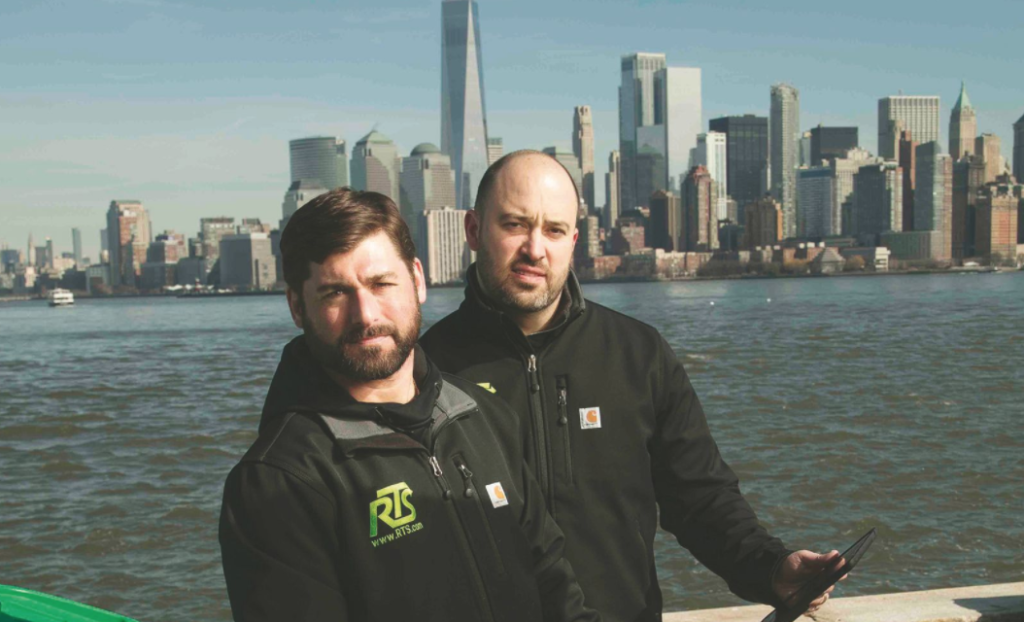A fourth-generation member of a New York waste-hauling family, Adam Pasquale had been working in the industry for nearly two decades when he came up with an idea: create a carting company that doesn’t cart.
Instead, it would provide waste pickups on demand using technology that has transformed other transportation sectors, namely a mobile app that hands off jobs to independent operators.
The app would make it easy for customers to place orders and could alert them about arrivals and missed pickups. It also could document the waste trail for clients, who increasingly want to know where their garbage ends up.
Pasquale bounced his ideas off his old friend Gregory Lettieri, who had risen through the telecommunications industry to become senior vice president of product management at Bank of America. Lettieri saw a good foundation for a business but wanted a second opinion from an expert versed in waste logistics.
That was easy to arrange. They met with Pasquale’s father, who would soon become one of the friends-and-family group that invested in Recycle Track Systems before Lettieri and Pasquale launched it in 2015.
Dad’s bet was a smart one. The company’s ability to track waste streams has given it an edge in navigating city regulations that require businesses to separate more and more of their trash, including electronics and food waste.
Leading the pack
RTS now handles waste removal and recycling for more than 500 customers, including blue-chip businesses such as Whole Foods, Barclays Center, WeWork and The Pierre hotel. Revenue hit $10 million last year, up 300% from 2016.
“We are a full-service waste company,” said Lettieri, who is chief executive. “We just happen to do it by not owning the trucks.”
The company’s tech-first approach works a little like Uber’s: The app finds the best match between a hauler’s existing routes and customers. One difference, however, is that once a hauler and a customer are matched, RTS maintains that relationship rather than sending the nearest available truck the next time. RTS contracts with about 10 licensed operators vetted to meet its customers’ needs.
“I’m working my own routes with my own business, and I’m adding their work,” said James Tesi, an owner of City Waste Services, which started working with RTS two years ago. He says the partnership has helped grow his business, an independent operator with nearly 20 trucks, by 8% to 10%.
RTS has also been aggressive in creating sustainability programs. Recently it won Citi Field’s business by giving the stadium a top-to-bottom plan that includes signage, staff training, fan education, bins and comprehensive waste tracking. The aim is to keep organic waste free of plastic cups and straws so that composting farms will accept it. The startup will also monitor how much food waste is diverted from landfills—where it breaks down into methane and contributes to global warming—and provide documentation the Mets can use in promoting their ecofriendliness. The franchise wants to stay ahead of the city’s pace.
“We’ve wanted to be more aggressive with a lot of things, not just maintain the status quo,” said Michael Dohnert, Citi Field’s senior director of ballpark operations. “RTS was pretty aggressive.”
The company’s services will cost more than that of the stadium’s previous provider, Action Environmental Services. But Dohnert believes it is worth it. “We’re going to be getting so much of what we want on an organizational level,” he said.
Some veterans of the industry point out that RTS is far from the only waste company using new technology and wonder how long it will be able to brand itself as an innovator as other providers modernize. Action, for instance, is rolling out Routeware, a system that tracks routes, alerts clients to missed pickups and performs post-trip analysis. The region’s largest waste hauler, Action continues “to hold very valuable relationships with other notable sporting venues in the area,” a spokeswoman said.
But RTS argues that its app is part of an overall approach that can’t be easily replicated by operators whose specialty has long been in transportation logistics.
“Traditional waste companies are very good transporters,” Lettieri said. “They’re not good at data transparency and developing sustainability plans.”
RTS sees its growth as just beginning. Over the summer it raised $11.7 million in venture capital funding, which allowed it to expand into Philadelphia and Washington, D.C., during the fall. The company has also developed a network of composting and other organic recycling options that will become ever more important as the city expands the number of businesses required to separate organic waste, as it’s expected to later this year.
“We built [the business] because we thought there was a need,” not because he and Pasquale saw the regulations coming, Lettieri said. “We got lucky.”
– Matthew Flamm|Crain’s

